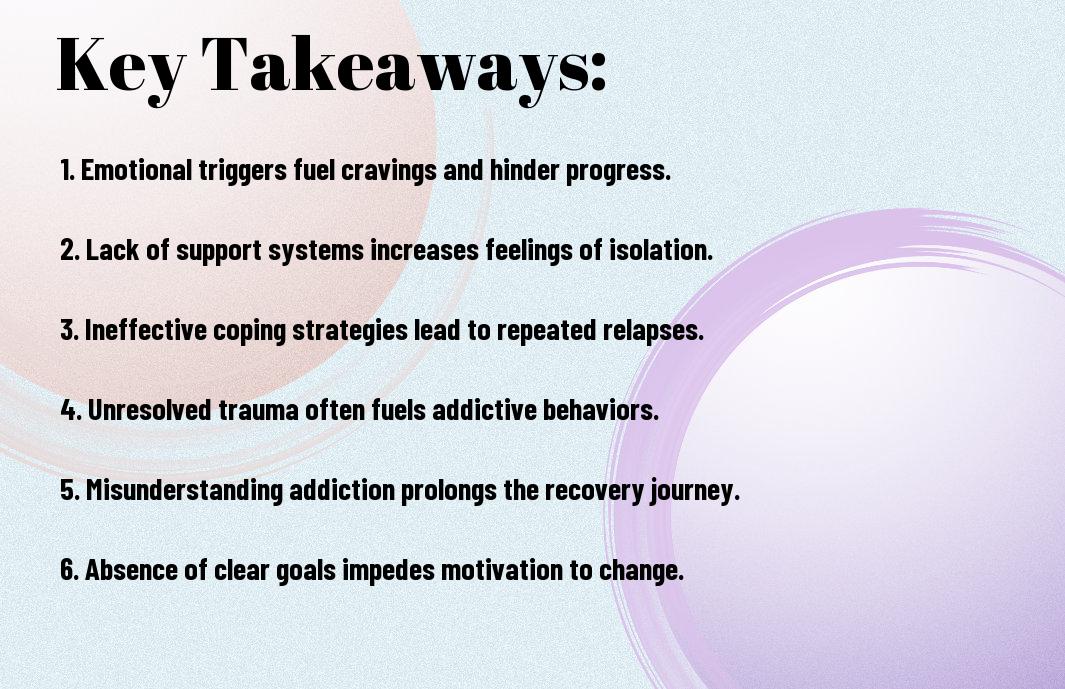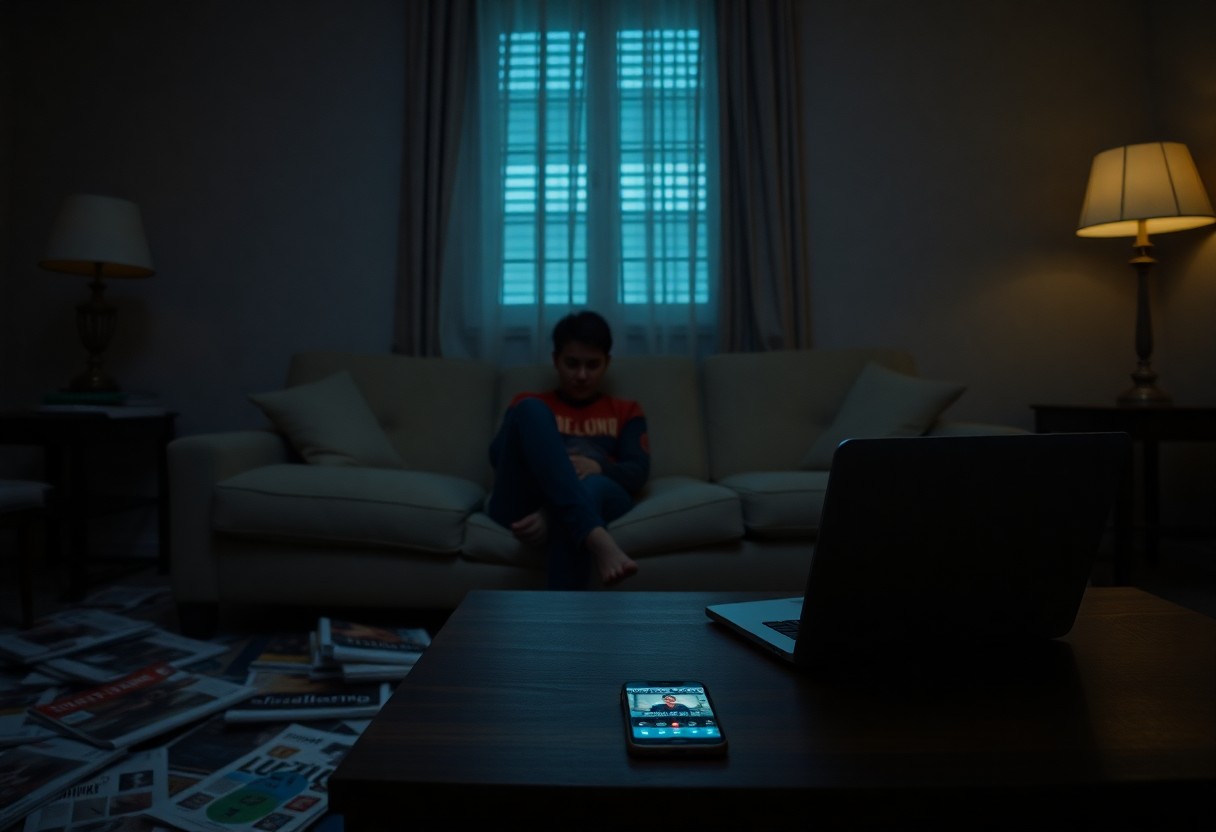Recovery from porn addiction can be a complex journey filled with challenges that can hinder your progress. Various factors such as societal stigma, emotional triggers, and lack of support can impede your ability to overcome this addiction. Understanding these obstacles is crucial for you to navigate your path to recovery effectively. In this post, you will discover the key elements that may be holding you back and how to address them to foster a healthier relationship with yourself and your sexuality.
Key Takeaways:
- Fear of withdrawal symptoms can deter individuals from fully committing to their recovery process.
- Ambivalence about wanting to change can lead to mixed signals and inconsistent efforts.
- Isolation from supportive communities or lack of accountability contributes to prolonged addiction.
- Triggers in the environment, such as certain media or social interactions, can easily lead to relapse.
- Inadequate coping strategies for stress or emotional challenges can result in a return to old habits.
- Pursuing recovery without professional guidance may limit progress and understanding of underlying issues.
- Negative self-talk and low self-esteem can hinder motivation and belief in the possibility of recovery.


Understanding Porn Addiction
Before exploring recovery options, it’s necessary to comprehend the nature of porn addiction. This addiction can affect various aspects of your life, impairing your relationships, work, and overall mental well-being. By defining the problem clearly, you can better understand the barriers that may hinder your recovery journey.
Definition and Scope
Among the many forms of compulsive behavior, porn addiction manifests as an inability to control your consumption of pornography, despite negative consequences. This addiction can range from casual viewing habits to chronic compulsions that interfere with daily functioning.
Psychological Effects
Effects of porn addiction go beyond mere consumption; they can significantly alter your mental health and perceptions. You may experience anxiety, depression, or low self-esteem, often accompanied by feelings of shame or guilt about your behavior.
Also, ongoing engagement with porn may lead to distorted views of intimacy and relationships, making it difficult for you to connect with partners in a healthy manner. This disconnect can contribute to further isolation and emotional distress, compounding the issues that led to your addiction. Understanding these psychological effects is vital to addressing and overcoming the addiction effectively.

Common Barriers to Recovery
If you are striving to break free from porn addiction, you may encounter several barriers that hinder your progress. Recognizing these obstacles is the first step towards effective recovery. Patterns in behavior, emotional struggles, and external influences can all play significant roles in perpetuating this cycle. Understanding these barriers allows you to develop strategies that will facilitate your journey towards a healthier relationship with yourself and your life.
Emotional Triggers
Along your path to recovery, emotional triggers can be prominent obstacles. These triggers often manifest as stress, loneliness, or anxiety, prompting you to seek comfort in familiar habits. Identifying and managing these triggers is imperative, as they can pull you back into old patterns and derail your progress.
Environmental Influences
Besides emotional triggers, your environment can have a profound impact on your recovery journey. External factors like the presence of devices, access to pornography, or social settings can create temptations that challenge your commitment to change. Being aware of these influences and actively modifying your surroundings plays an important role in maintaining your resolve.
Understanding your environment requires a close examination of the places and situations that promote your porn use. You may need to limit access to certain online content or avoid places where porn is easily available. Creating a positive and safe space for your recovery involves seeking supportive relationships and engaging in activities that promote well-being. By ensuring that your environment aligns with your goals, you will bolster your chances of overcoming addiction and enhancing your overall quality of life.
The Role of Shame and Guilt
Not addressing shame and guilt can significantly hinder your recovery from porn addiction. These emotions often stem from societal views and personal beliefs about pornography, leading to a cycle of negative self-talk. This can create further barriers to seeking help and understanding your behavior. To learn more about overcoming these emotional hurdles, check out How to Stop a Porn Addiction: Samarpan’s Practical Guide.
Impact on Self-Esteem
Before you can effectively combat your porn addiction, it is crucial to recognize how it affects your self-esteem. Engaging in compulsive behaviors often leads you to feel inferior or ashamed, further diminishing your self-worth. This negative perception can prevent you from wholeheartedly pursuing recovery, as you may believe you are unworthy of change.
Creating a Cycle of Addiction
For many, the experience of shame and guilt after engaging in porn can lead to a vicious cycle. You may seek temporary relief by turning back to porn, which reinforces these negative emotions and further perpetuates the addiction. This cycle can trap you in a detrimental feedback loop that becomes increasingly difficult to escape.
Due to the immediate relief that porn provides, you might find yourself caught in this cycle more frequently. Each time you indulge, feelings of guilt emerge, prompting you to seek solace in porn again. This not only weakens your resolve but also deepens the emotional turmoil associated with your addiction, making it crucial to address these feelings as part of your recovery journey.
Support Systems and Their Importance
Your recovery from porn addiction is not a journey you have to undertake alone. Building a strong support system is imperative as it provides accountability, encouragement, and understanding from those who have either faced similar challenges or are committed to helping you. Engaging with supportive family and friends, seeking professional help, and finding community resources can significantly enhance your chances of recovery. These connections offer a safe space to explore your feelings, share successes, and navigate the hurdles you may encounter on your path to wellness.
Therapy and Counseling Options
Around the world, professional therapy and counseling options are available to assist you in addressing the underlying issues associated with porn addiction. Individual or group therapy can help you gain insights into your behaviors, coping mechanisms, and emotional responses. Therapists trained in addiction can provide you with tailored strategies to change patterns and develop healthier habits. By investing time in therapy, you empower yourself to confront your challenges and facilitate long-term recovery.
Support Groups and Community Resources
Any successful recovery plan should include support groups and community resources that can provide encouragement and shared experiences. These groups can offer a sense of belonging and help you to connect with others who understand the struggles of overcoming porn addiction. The discussions and activities within these groups create a safe environment for you to express your feelings and receive valuable feedback from peers who have been through similar experiences.
At support groups, you will find a diverse range of individuals who share their experiences and coping strategies. Engaging in these platforms allows you to learn from others and realize that you are not alone in your struggles. These communities often host workshops, online forums, and in-person meetings, providing various forms of interaction. Accessing local or online resources can empower you to build connections, find accountability partners, and stay motivated on your journey toward recovery.

Coping Strategies for Recovery
Keep in mind that developing effective coping strategies is imperative for your recovery journey. Identifying triggers and cultivating healthier responses to them can significantly reduce the urge to revert to past behaviors. Engaging in supportive environments and open conversations about your struggles can provide encouragement and accountability, ultimately enabling you to move forward.
Building Healthy Habits
To foster recovery, focus on building healthy habits that replace the time and energy once dedicated to pornography. Incorporate activities such as regular exercise, reading, or connecting with friends into your routine. These practices not only strengthen your resolve but also enhance your overall well-being, making it easier to stay committed to your recovery goals.
Mindfulness and Self-Awareness Techniques
Below are mindfulness and self-awareness techniques that can help you navigate your recovery with greater ease. Practicing mindfulness involves paying attention to your thoughts and feelings without judgment. Incorporating meditation, deep-breathing exercises, or journaling into your daily routine can deepen your self-awareness, allowing you to catch urges before they lead to actions.
Techniques such as mindful breathing exercises or body scans can help you become more attuned to your emotions and physical sensations. By reflecting on your thoughts and feelings, you create space between your impulses and actions. This practice enhances your ability to respond thoughtfully rather than reactively, which can be particularly beneficial when you encounter triggers related to your addiction.
Long-Term Strategies for Success
After committing to recovery, it’s vital to implement long-term strategies that enhance your journey. Focus on creating a structured routine and consider seeking professional guidance. Investing time in understanding the Porn Addiction Recovery Timeline can also provide valuable insights about what to expect as you progress.
Setting Realistic Goals
An effective way to ensure progress is by setting realistic and achievable goals. Break your larger aspirations down into smaller, manageable tasks. This approach will not only make your journey less daunting but will also allow you to celebrate small victories along the way, reinforcing your dedication to recovery.
Sustaining Motivation and Accountability
Motivation plays a significant role in your recovery process. It’s crucial to find ways to keep yourself engaged and committed to your goals. Establishing support systems can be beneficial, whether through friends, family, or support groups that share similar experiences.
For instance, participating in accountability sessions or journaling about your feelings and challenges can help sustain your motivation. Regularly revisiting your goals and reflecting on your journey will remind you of why you started, while sharing your experiences can create a support network that encourages you during difficult times.
Summing up
So, understanding what hinders your recovery from porn addiction is crucial for your long-term success. Factors such as environmental triggers, lack of social support, and underlying mental health issues can significantly impact your journey. It’s vital to identify these obstacles and actively work on strategies to address them, including building healthy relationships, seeking therapy, and adopting a supportive routine. By developing self-awareness and resilience, you can navigate these challenges more effectively and regain control over your life.
FAQ
Q: What are some common triggers that can hinder recovery from porn addiction?
A: Various triggers such as stress, loneliness, or relationship issues can make it difficult to stay committed to recovery. Environmental factors like being alone or having unrestricted access to the internet also play a significant role.
Q: How does lack of support affect the recovery process from porn addiction?
A: A strong support system is imperative for recovery. Without encouragement from friends, family, or support groups, individuals may feel isolated and may struggle to stay motivated on their healing journey.
Q: Why is it challenging to replace porn addiction with healthier habits?
A: Finding satisfying and fulfilling alternatives can take time. Many individuals have relied on porn for emotional relief or pleasure, and it can be difficult to identify and engage in different activities that fulfill those same needs.
Q: How do feelings of guilt and shame impede recovery from porn addiction?
A: Guilt and shame can create a cycle of negative emotions that lead individuals to seek comfort in porn once again. This makes it hard to break free from addiction, as these feelings can overwhelm a person’s motivation to pursue healthier choices.
Q: Can physiological changes in the brain due to prolonged porn use impact recovery?
A: Yes, studies have shown that extensive porn use can change the brain’s reward system, making it harder to experience pleasure from everyday activities. This biological aspect can complicate recovery, as individuals may struggle to find enjoyment outside of porn.
Q: What role does denial play in resisting recovery from porn addiction?
A: Denial can prevent individuals from acknowledging the extent of their addiction. When a person refuses to accept that porn is a problem, they are likely to avoid taking necessary steps toward recovery, thus prolonging their struggle.
Q: Why is setting unrealistic goals detrimental in the recovery from porn addiction?
A: Setting unattainable goals can lead to feelings of failure and disappointment. If individuals do not meet their expectations, they may feel discouraged and give up on their recovery journey, ultimately hindering their progress.
